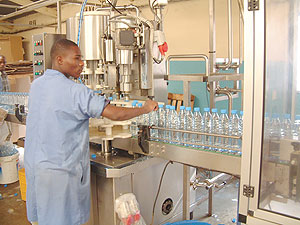Rwanda’s annual inflation eased by 0.19 percent to 5.74 percent in December 2009 from 5.93 percent in the previous month, according to the National Institute of Statistics of Rwanda (NISR). The statement released by the statistics body yesterday says that underlying inflation, which excludes fresh food and energy, cooled by 0.41 percent compared to the previous month and increased 3.46 percent on annual change.


Rwanda’s annual inflation eased by 0.19 percent to 5.74 percent in December 2009 from 5.93 percent in the previous month, according to the National Institute of Statistics of Rwanda (NISR).
The statement released by the statistics body yesterday says that underlying inflation, which excludes fresh food and energy, cooled by 0.41 percent compared to the previous month and increased 3.46 percent on annual change.
The NISR says that the decrease in the consumer prices index is attributable primarily to the decrease in food and non-alcoholic beverages which registered a slight drop of 2.69 percent as well as housing, water, electricity, gas and other fuels that fell by 1.32 percent.
"I t is noted that the decrease of 2.69 percent in prices of food and non-alcoholic beverages is primary attributable to the decrease of 10.06 percent of vegetables and 1.59 percent of Non-alcoholic beverages,” the statement said.
According to the NISR, in annual change, the increase in the general index of 5.74 percent is mainly due to the rising prices of food and non-alcoholic beverages that rose by 9.02 percent and transport that went up by as much as 11.75 percent, contributing 3.17 percent and 1.42 percent respectively.
"The ‘local goods’ increased by 6.32 percent on annual change with a monthly variation of -1.61 percent, while prices of the imported products rose by 1.37 percent on annual change with a monthly change of 0.91 percent,” the statement said.
The prices of the fresh products had a positive annual change of 20.49 percent between December 2009 and December 2008.
The Central Bank forecasts suggest that inflation may rise to between 6-10 percent by the end of 2010 at the back of high domestic demand that will be triggered by the current recovery in the credit market.
Rwanda is also expected to register a Gross Domestic Product (GDP) growth of around 7 percent as opposed to the previous financial year’s 11.2 percent due to the global financial crisis and the local credit squeeze that wrecked the real sector throughout 2009.
Ends


